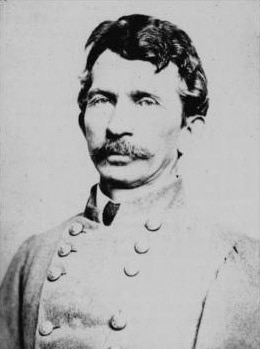Henry Watkins Allen was an officer for the Confederate Army during the Civil War. During the war, he was elected as the 17th Governor of Louisiana, and then, after Robert E. Lee's surrender, he left the United States for Mexico, where he lived until his death.

Early Life
- Henry Watkins Allen was born in Prince Edward County, Virginia, where he attended Marion College in Missouri.
- After college, he moved to Mississippi and practiced law
- He served during the Texas-Mexican War as a private. By the war's end, he was a captain.
- He was elected as a member of the Mississippi House of Representatives in 1846.
- He would also go on to study law at Harvard University
- He became a slave owner when he moved to Louisiana and acquired a sugar cane plantation.
- He would serve in the Louisiana legislature in 1853.
- Henry Watkins Allen left the United States in 1859 to serve in Italy's fight for independence
- By the time he reached Europe, Italy's war for independence was over, so he toured through Europe
- He wrote memoirs titled Travels of a Sugar Planter
- During his absence, he was re-elected to Louisiana's legislature
- He had been a member of the Know Nothing, but after the election of James Buchanan, he joined the Democratic Party.
Civil War Service
- When the Civil War broke out, Allen enlisted as a private in the 4th Louisiana Infantry Regiment.
- He was quickly promoted to Lieutenant Colonel by August 15, 1861.
- During the battles of Shiloh and Baton Rouge, he received severe wounds.
- While recuperating from his wounds, he served as military judge of Pemberton's Army of Mississippi and as Major General of the Louisiana Militia.
- He received another injury from a bad fire at a hotel in Jackson, Mississippi.
- On August 19, 1863, he was promoted to Brigadier General.
- During that time, he decided to run for Governor of Louisiana, which he won.
- His governorship ended when the Confederacy collapsed in the spring of 1865.
- Because the lack of medicine was acute in the Confederacy, Allen devoted extensive time and resources toward establishing a large intelligence and covert action service that could secretly procure vital supplies, especially medicine such as quinine, from behind Union lines in New Orleans or from Mexico.
Post-War Life and Death
- As the Union army forces started taking over free Louisiana, military authorities declared Governor Allen an outlaw, punishable by death upon his capture.
- In 1865, James Madison Wells replaced Allen as Governor of Louisiana.
- After his move to Mexico, he assisted in the opening of trade between Texas and Mexico.
- He died young of a stomach disorder.
